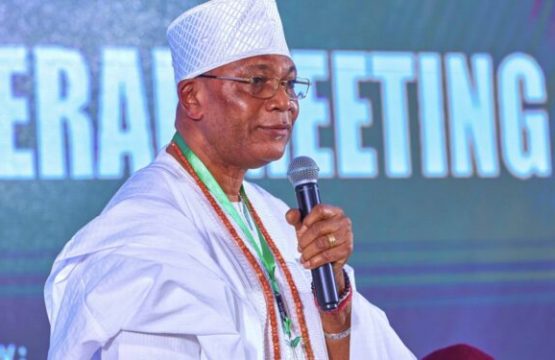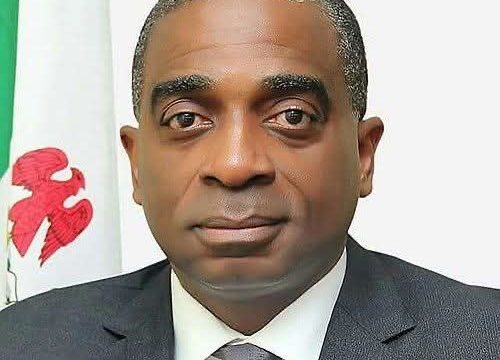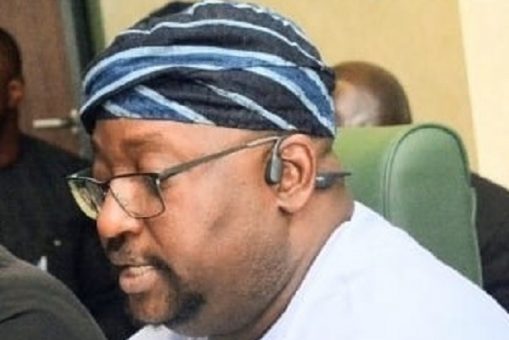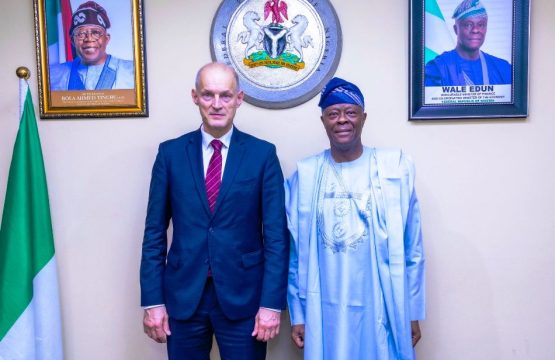The Manufacturers Association of Nigeria (MAN), the Lagos Chamber of Commerce and Industry (LCCI) , the Nigeria Employers’ Consultative Association (NECA), including the Nigerian Association of Chambers of Commerce, Industry, Mines, and Agriculture (NACCIMA) have appealed to the leadership of the Nigeria Labour Congress (NLC) and the Trade Union Congress (TUC), to listen to the voices of reasons and accept a sustainable minimum wage.
The business membership organisations (MBOs) made the appeals in their different positions statement on the new minimum wage negotiations between the Federal government and the leadership of the labour unions
While the MAN is displeased with the lingering minimum wage negotiations and said that it’s dragging the economy backwards and distorting the current administration’s focus on developing the economy, which is a focal point for the private sector and Nigerians in general.
MAN’s Director-General, Mr. Segun Ajayi-Kadir, lamented that the issue of minimum wage was currently taking the centrestage at the moment when the Federal Government still has a lot to do in fixing the fragile economy, especially infrastructural deficit, inflation, exchange rate, power, ease of doing business, port infrastructure and others.
Ajayi-Kadir stated that the labour unions leadership should know that any increment by government systematically leads to slight increase in rent, transport, foods etc, which will always have a multiplier effect on the macro and microeconomy.
“The government cannot continue to channel its energy on minimum wage with the labour unions leadership at a period the county’s economy is experiencing problems that have been affecting businesses locally and seeing multinational companies relocating out of Nigeria.
Ajayi-Kadir stated: “₦494,000 is more than 16 times the current minimum wage of ₦30,000. If the Federal Government accepts that as the new minimum wage, and Nigeria’s production capacity does not also increase sixteen times, it will lead to the mother of all inflation that will destroy the Nigerian economy and turn us into Zimbabwe and Venezuela.
“If producers of goods and services, like Dangote, Dufil, Nestle, Flour Mills of Nigeria, Glo, petrol stations, etc, have to pay their staff a minimum of ₦494,000, what do you think they will charge for their products? “You, as a worker, will be jumping from frying pan to fire.”
He added, “Joe Ajaero and his hords are not economists, and worse still, they do not know the precarious state of the country’s economy since they are not manufacturers of products in the country.
“So labour should employ experts and study a long run plans that will better the life of the labourers. I study the National Bureau of Statistics in Nigeria.
In 2021, employed labour in Nigeria was 75 million (12 percent are government’s workers: FGN/SGN/ LGN) with increase yearly of 5.8 percent., by my working I found out that as at 2023, our total labour force of the Federal-State-Local will amount total 12 million staffs all over Nigeria.
If all 12 million staffs by N30,000 by 12 months, the government needs about N4.32 trillion to keep the staff going on minimum of that. So government needs almost N12 trillion to keep the staff from levels 1-17+ or the highest cadre per year.
“If producers of goods and services, like Dangote, Dufil, Nestle, Flour Mills of Nigeria, Glo, petrol stations, etc, have to pay their staff a minimum of ₦494,000, what do you think they will charge for their products? “You, as a worker, will be jumping from frying pan to fire.”
Kindly correct me if wrong. Who bear it the remaining private businesses bears the cost.
“If minimum wage rises to N60,000 that’s almost N24 trillion or more needed to push the labour force wages.
“Taxes and charges must go up. Our CIT, EDT, VAT, Withholding taxes will definitely shoot up. So let the labour be well advice.
“Let look into the labour law that pay on hour basis and good rate. Just like the way it’s established in modern countries. That will be fair and just for laborers all over Nigeria. Not only government workers alone,” he said.
His counterparts at the LCCI, also reasoned with the labour unions to avoid a situation where it is forcing a wage bill on government and businesses that could eventually lead to job losses and worsen poverty levels.
The Director-General of LCCI, Dr. Chinyere Almona, in a press statement, said that the chamber was calling on the labour unions to be more flexible, reconsider the government’s offerings, and be concerned about how private businesses can afford to pay the set wage without considering shutting down operations or cutting jobs.
The LCCI DG said: “Considering the ongoing negotiations regarding a new national minimum wage, we urge all parties to consider a wage that reflects a good balance of economic realities, affordability, and sustainability.
“We can avoid a situation where we force a wage on government and businesses, which will eventually lead to job losses, worsened poverty levels, and so much money chasing few goods .
She stated that beyond the new minimum wage, the chamber is more concerned about having a more productive economy with a robust infrastructural base supporting a economy.
On its own part, NECA) – the umbrella organisation of all employers in the Organised Private Sector (OPS), said that it ‘painfully’ accepted the N62,000 national minimum wage after much deliberation, although the organised labour are insisting on the payment of a national minimum wage of N250,000, while the federal government has offered N62,000.
He said: ” Everything basically rests on the economy. Can the economy carry it? Can organised businesses as it currently constitutes, carry it? Those are parameters that we can’t run away from.
Now, the reality for us is this, as organised private sector. I would not want to delve into the realities of government. I would not want to delve into the N250 thousand realities of organised labour. “Ability to pay is a fundamental part of that issue that we have to take that into consideration. Enterprise sustainability is also a fundamental part of those parameters that we have to take into consideration.
The state of the economy is also a fundamental part of that parameter. And then the needs of workers is also a fundamental part of that conversation,” he explained. The NECA DG noted that with a wobbly economy, sustainability will remain a major issue before the demand of labour can be met.
“ And for me and for the organised private sector it’s this. What should be our objective now that the economy is standing on one leg, as some have said? Do we pay a wage that is unsustainable? Do we pay a wage that will also fast track the current challenge of unemployment rates?
Those are the critical conversations that we need to have,” he explained.
He argued that as it is, many companies are closing shop, while many more Nigerians are being thrown into the labour market, insisting that Nigerians cannot continue to play the ostrich.
“All of us cannot play the ostrich and act as if our brothers and sisters are not losing their jobs.
We cannot play the ostrich and behave as if companies are not closing down or reducing their capacity utilisation. We cannot play the ostrich.”
Dele Kelvin Oye, the National President of NACCIMA, in his own reactions, reiterated the need to follow due process and ensure that all discussions around the adjustment of the minimum wage are based on a comprehensive understanding of the facts and implications and that the new wage is reflective of the nation’s economic realities.
First and foremost, NACCIMA acknowledges the critical role played by the Nigerian workforce in driving the economic growth and development of our nation. It is the hard work and dedication of our workers that sustain the businesses and industries that NACCIMA proudly represents.
We also recognise that the current economic climate, characterised by high inflation and a depreciating Naira, exerts significant pressure on the standard of living of workers and their families.
“However, we must emphasise the importance of following due process and ensuring that all discussions around the adjustment of the minimum wage are based on a comprehensive understanding of the facts and implications..
“As such, it would be premature and unfair for NACCIMA or any other member of the recently constituted 37-man Committee to join issues with the NLC President or engage in public debates on the matter without first having the opportunity to review the facts and basis of the proposed N1 million minimum wage.
”The NACCIMA boss charged, “We encourage all parties involved to approach this issue with a spirit of cooperation and constructive dialogue. NACCIMA is committed to working alongside the NLC, the federal government, and other stakeholders to ensure that a fair and sustainable wage structure is established, one that reflects the economic realities of our nation and the welfare of our workforce.”
He further noted, “ NACCIMA appeals to all parties to exercise patience and engage in negotiations that are founded on empirical data, economic analysis, and the shared goal of economic stability and prosperity for all Nigerians
The NLC President Joe Ajaero, at different foras painted a grim picture of escalating inflation and a depreciating Naira, emphasising their direct impact on wage demands.
He stressed that previous wage negotiations were anchored on similar economic indicators, and the current situation necessitates a significant revision.
In a highlighted gravity of the situation, Ajaero drew attention to the stark difference between past negotiations and the present reality.
Essential commodities like rice, he pointed out, now cost a staggering N60,000 to N70,000 per bag, placing them beyond the reach of many workers. This dire situation, he warned, could trigger widespread discontent and potential strike actions if left unaddressed.
He said: ” Everyone understands that it is difficult to survive in Nigeria. And that brings me to the issue of minimum wage demand we are making. You know, if you check the cost of living index in this country, you can’t get less than that N615,000 we are asking for.
That N615,000 we ask for is not for somebody to live in a flat, it is for maybe a room and parlour. You can’t even buy a phone or recharge cards to communicate. It is not for somebody who will buy a recharge card.
If you check all that we analyze there, there is no room for entertainment. And you dare not have relations, or more than four children and one wife. If you do, you will not survive in this situation. You can’t pay tithe or offering in church, and it’s not for people that have cars because you can’t service your car.
We looked at it, N500 per meal per person in a family of six. In a day, it’s about N1,500. For six people in a month, we are talking of N270,000 for feeding alone. We looked at housing and accommodation and fixed about N40,000 for a room and parlour, in a conservative sense.
We looked at education for our four children. We put N50,000. Definitely, it’s not a private school anyway. We looked at gas and kerosene, all those issues. If you take one cylinder to refill it, it is about N14,000 or N15,000. Now, if you have to refill it two times in a month, it is over N30,000.
For electricity, before the current tariff increases, we put N20,000 . Of course, you know better now, you know how it goes. And by the time you bring all these things together, that was how we got N615,000. But it is open for negotiation. ▪︎










